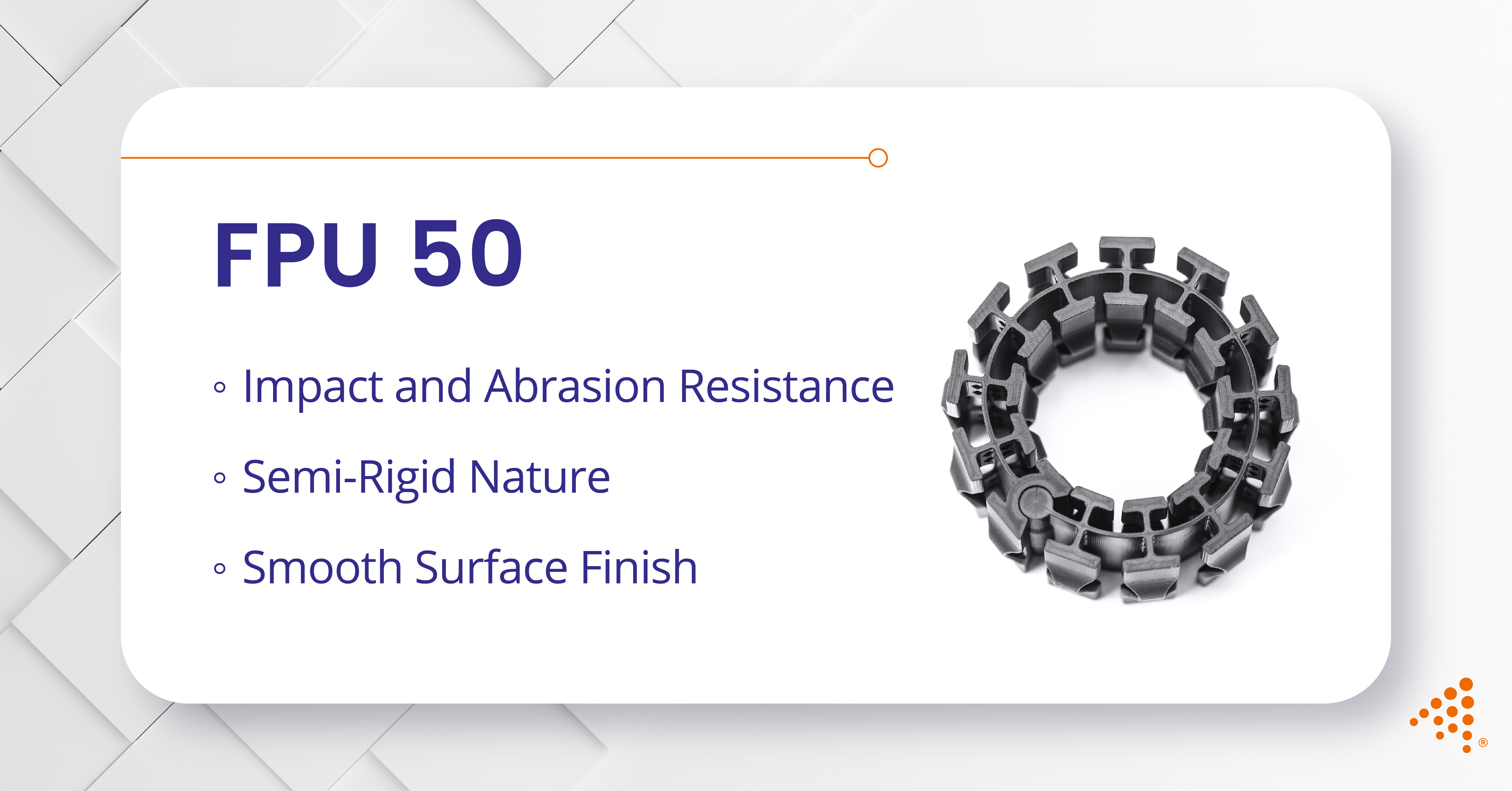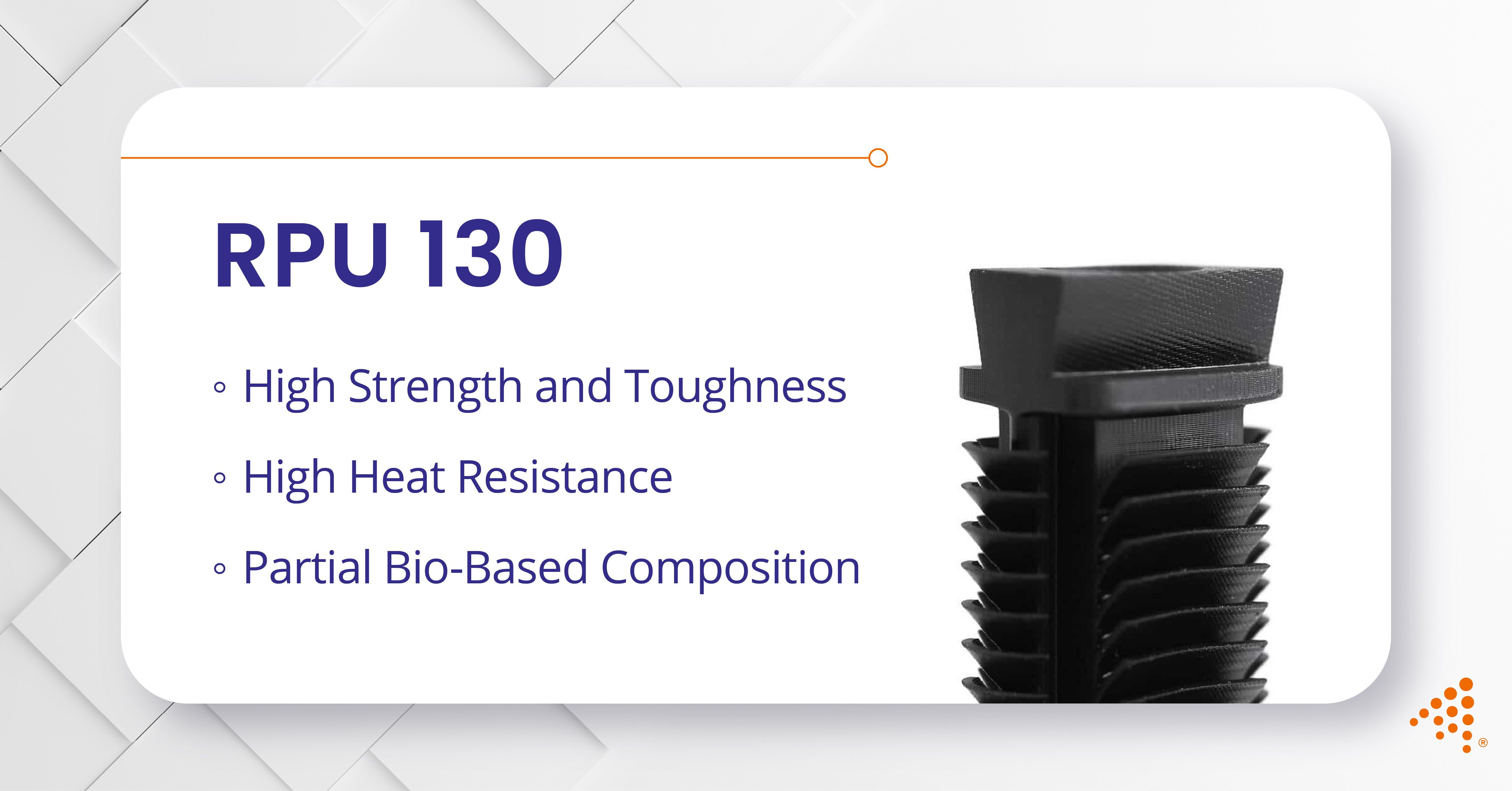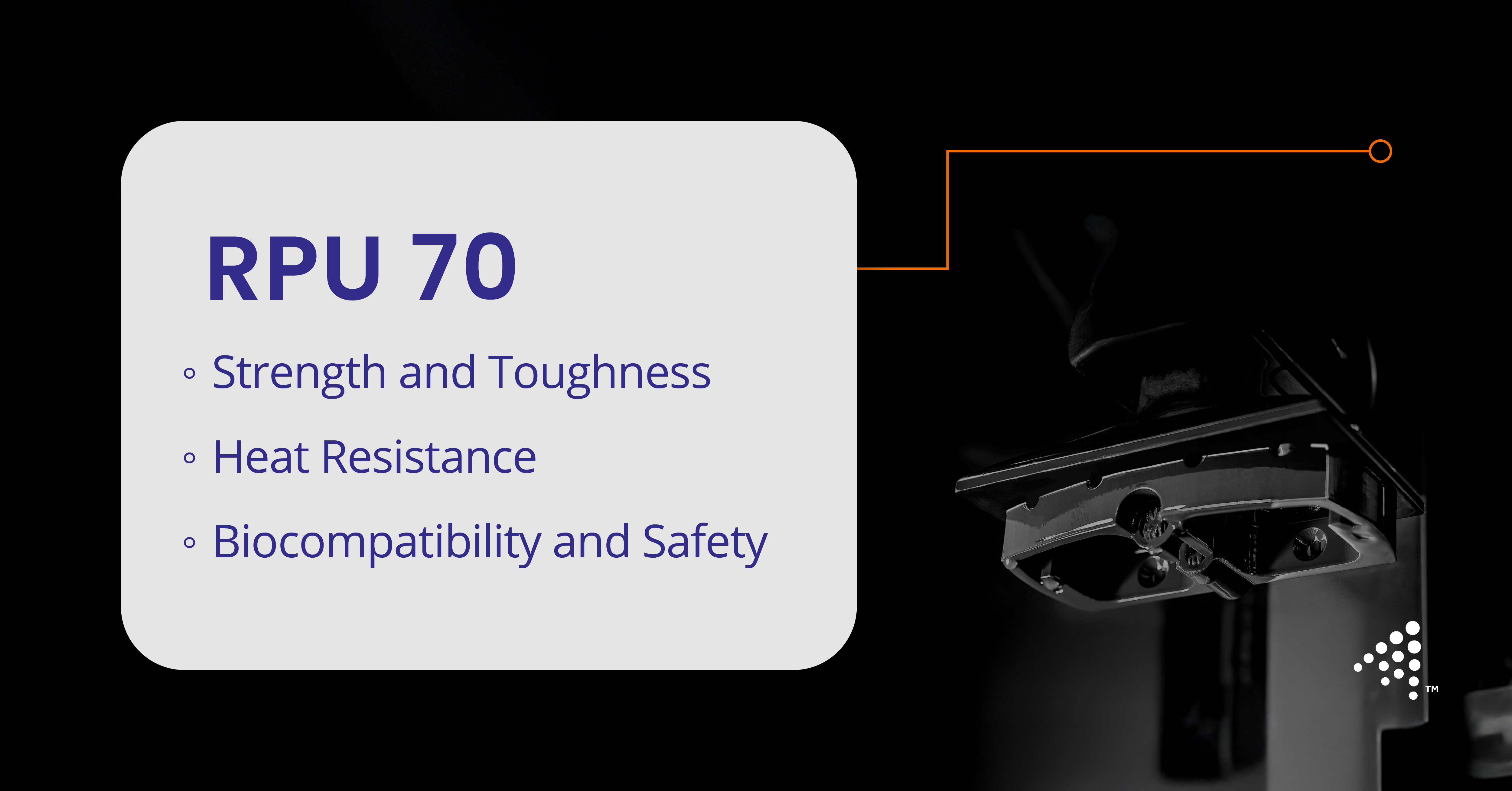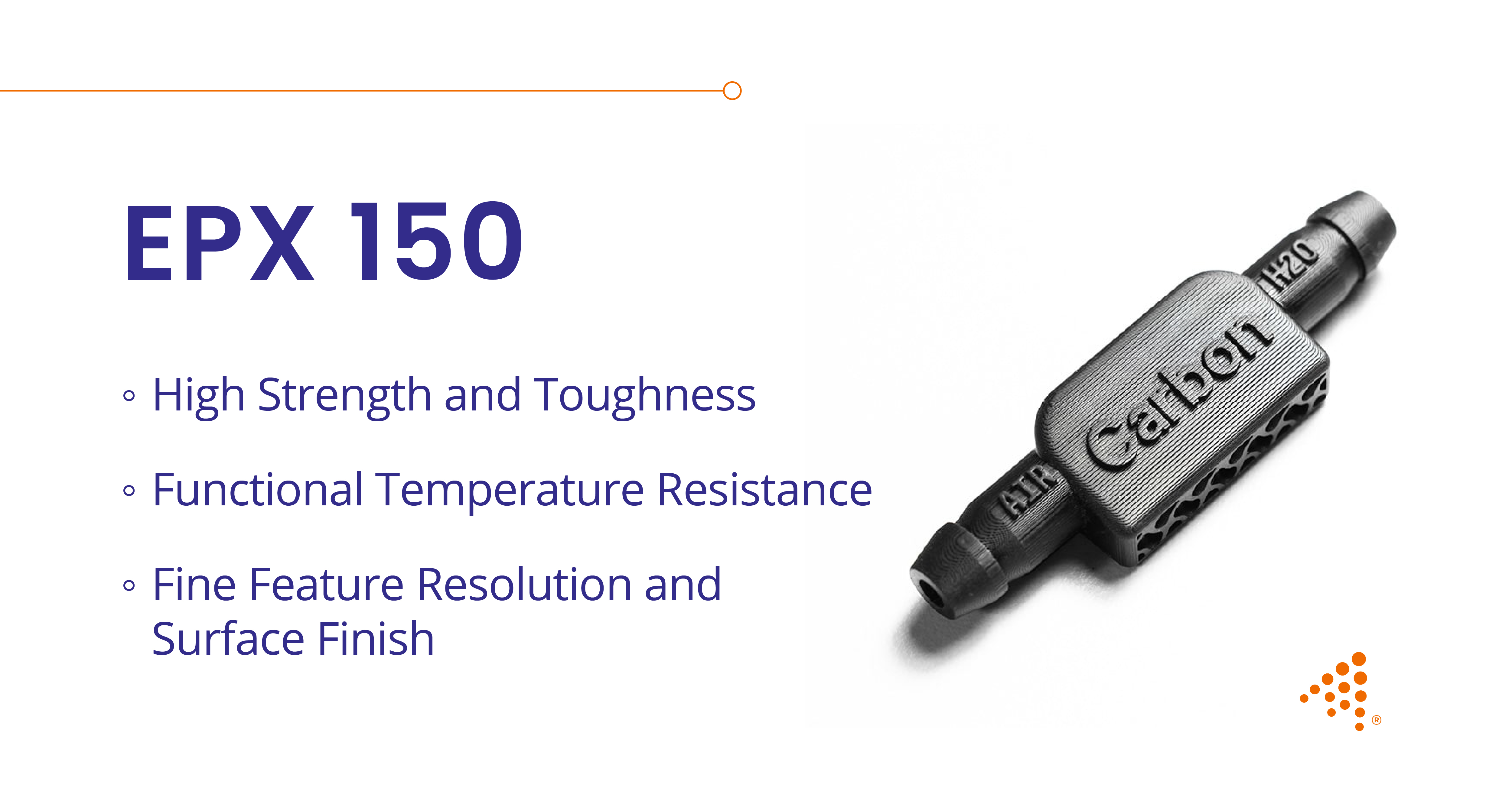RPU 130: High-Performance, Heat-Resistant Resin
Rigid Polyurethane 130 (RPU 130) is an engineering-grade material by Carbon used in additive manufacturing, specifically with Carbon's Digital...

Flexible Polyurethane (FPU) 50 is a semi-rigid material from Carbon known for its exceptional impact, abrasion, and fatigue resistance. This versatile resin is engineered for parts that must endure repetitive stresses and demanding conditions, making it a reliable choice for industries requiring durable components, including those in the medical injection molding sector. FPU 50’s unique combination of toughness and flexibility allows for the creation of robust parts that can withstand significant wear and tear.
Read More About The Ultimate Guide to ABS for High-Performance Manufacturing
FPU 50 is distinguished by a set of properties that make it suitable for a wide array of functional parts and end-use components.
One of the hallmark characteristics of FPU 50 is its impressive toughness and ability to resist fatigue. This means that components made from FPU 50 can withstand repeated loading, flexing, and impact without succumbing to failure. This resilience is critical for parts that are subjected to cyclical stresses during their operational life, offering long-term durability.
FPU 50 exhibits high resistance to impacts and abrasions. This makes it an ideal material for parts that may experience drops, collisions, or surface wear. Its ability to absorb energy and resist scratches or wear contributes to the longevity and aesthetic preservation of the manufactured components, which is particularly beneficial in high-contact environments.
While tough, FPU 50 also possesses a semi-rigid quality. This allows for a degree of flexibility, which is crucial for applications like snap-fit enclosures or living hinges. This characteristic allows parts to bend and return to their original shape, providing a balance between stiffness and elasticity that is not always achievable with more rigid materials.
Parts produced with FPU 50 can achieve a smooth surface finish. This is advantageous for aesthetic reasons as well as functional ones, as a smoother surface can reduce friction and improve the interaction with other parts in an assembly. This quality is also beneficial for injection molding applications where surface quality is paramount.
Ready to Strengthen Your Parts with FPU 50?
Contact Aprios today to discover how our advanced material expertise and additive manufacturing capabilities can help you create flexible, fatigue-resistant parts built to endure high stress and repeated motion.
The unique blend of properties found in FPU 50 lends itself to a variety of practical uses across several industries.
The material's excellent fatigue resistance and semi-rigid nature make it a prime candidate for creating living hinges—thin, flexible sections of plastic that connect two rigid parts and can be flexed repeatedly. It is also well-suited for snap-fit components, where its toughness allows for secure, repeatable connections.
For devices and equipment that require durable protection, FPU 50 can be used to create robust enclosures and housings. Its impact and abrasion resistance safeguard internal components from external stresses, making it suitable for consumer electronics, industrial equipment, and medical devices.
FPU 50 is utilized for manufacturing mounts and brackets that require a combination of strength and some degree of flex. These components can securely hold other parts in place while also absorbing vibrations or minor impacts, contributing to the overall stability and longevity of an assembly.
While not its primary application, the semi-rigid nature and reasonable chemical resistance of FPU 50 allow it to be considered for certain types of seals and gaskets where a balance of flexibility and durability is required, especially in environments where it might encounter repetitive motion or compression.
Read More About Elevate Your Team with Aprios: A Partner in Innovation
Carbon's FPU 50 is frequently compared to Polypropylene (PP), a widely used thermoplastic in traditional injection molding. Both materials offer good fatigue resistance and toughness, making them suitable for applications involving repeated stress and flexing, such as living hinges and snap-fit closures. Polypropylene is known for its chemical resistance and low density, and FPU 50 mirrors these benefits to a degree, providing durability and a good strength-to-weight ratio.
However, FPU 50, being a polyurethane elastomer processed via additive manufacturing, offers distinct advantages in terms of design complexity and speed for prototyping or low-to-mid volume production. While PP is a cost-effective material for high-volume injection molding, achieving complex geometries can require intricate and expensive tooling. FPU 50 allows for the direct production of complex parts without the upfront tooling costs associated with injection molding. Furthermore, FPU 50 generally offers higher elongation at break compared to many standard PP grades, providing enhanced flexibility and impact absorption in certain scenarios. The surface finish and dimensional accuracy achievable with Carbon's DLS™ technology using FPU 50 can also be superior for intricate designs compared to what might be economically feasible with mass-produced injection molded PP parts, especially for textured or highly detailed surfaces.
While FPU 50 offers many advantages, there are some limitations to consider.
FPU 50 has a heat deflection temperature of around 158°F (70°C), depending on the load. This means it may not be suitable for applications involving continuous exposure to higher temperatures, as the material could soften and lose its mechanical properties.
While FPU 50 offers resistance to some common chemicals, it may not be suitable for environments with aggressive solvents or strong acids and bases. Its chemical compatibility should be carefully evaluated for specific applications to prevent degradation.
Like many polyurethanes, prolonged exposure to UV radiation can lead to degradation over time, potentially causing changes in color and mechanical properties. For outdoor applications, additional UV protection or coatings might be necessary.
Compared to some commodity thermoplastics used in traditional manufacturing methods like injection molding, the raw material cost for FPU 50, as an advanced additive manufacturing resin, can be higher. This is often offset by the benefits of tool-less production, design freedom, and speed for certain volumes, but it's a factor in overall project cost.
Looking for a Tougher, More Flexible Material?
Partner with Aprios to leverage FPU 50 for parts that demand high impact resistance, long-term fatigue performance, and durability in real-world applications.
FPU 50 is an excellent choice for applications demanding a combination of toughness, fatigue resistance, and impact strength with a degree of flexibility. Its ability to produce durable, semi-rigid parts with a smooth surface finish makes it suitable for functional prototypes, end-use components, and parts subjected to repetitive stress. Industries such as consumer electronics, automotive, and medical device manufacturing can benefit from FPU 50’s resilience in applications like protective housings, flexible connectors, and durable interface components. The additive manufacturing process allows for complex geometries that might be difficult or costly to achieve with traditional methods, offering designers greater freedom and the ability to consolidate parts.

Rigid Polyurethane 130 (RPU 130) is an engineering-grade material by Carbon used in additive manufacturing, specifically with Carbon's Digital...

Rigid Polyurethane (RPU) 70 by Carbon is a versatile and robust material used in Carbon's Digital Light Synthesis (DLS) additive manufacturing...

EPX 150 is an advanced, rigid epoxy-based engineering resin developed by Carbon and purpose-built for additive manufacturing services that demand...